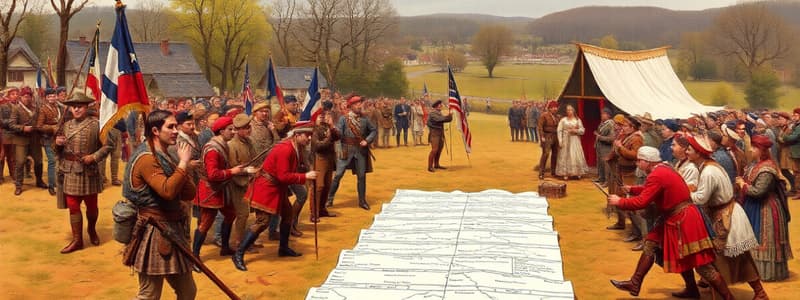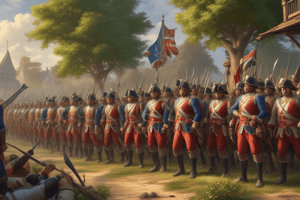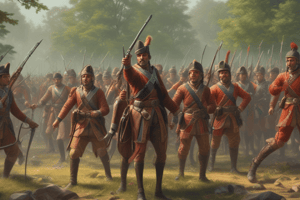Podcast
Questions and Answers
What was the significance of the Albany Plan of Union?
What was the significance of the Albany Plan of Union?
- It established the first organized colonial resistance against British rule.
- It was the first attempt to create a unified government for the Thirteen Colonies. (correct)
- It introduced the concept of natural rights to the colonies.
- It marked the end of the French and Indian War.
Which act imposed a tax on paper goods in the American colonies?
Which act imposed a tax on paper goods in the American colonies?
- Sugar Act (1764)
- Stamp Act (1765) (correct)
- Tea Act (1773)
- Townshend Acts (1767)
What was a key outcome of the Treaty of Paris (1763)?
What was a key outcome of the Treaty of Paris (1763)?
- It established a tax system in the colonies.
- It ended the French and Indian War and ceded French territories to Britain. (correct)
- It prohibited colonists from settling west of the Appalachian Mountains.
- It recognized the independence of the American colonies.
Which event is often cited as a catalyst for escalating tensions between colonists and British authorities?
Which event is often cited as a catalyst for escalating tensions between colonists and British authorities?
Who wrote 'Common Sense,' a pamphlet that advocated for American independence?
Who wrote 'Common Sense,' a pamphlet that advocated for American independence?
What was the main purpose of the Proclamation of 1763?
What was the main purpose of the Proclamation of 1763?
Name the battle that is considered a turning point in the American Revolutionary War.
Name the battle that is considered a turning point in the American Revolutionary War.
The Intolerable Acts were enacted as a response to the Boston Tea Party.
The Intolerable Acts were enacted as a response to the Boston Tea Party.
The _____ was a group formed to resist British rule through protests and other actions.
The _____ was a group formed to resist British rule through protests and other actions.
Match the following events with their descriptions:
Match the following events with their descriptions:
Flashcards are hidden until you start studying
Study Notes
French & Indian War
- War between Great Britain and France in North America for control of land.
- Allied with each side were Native American tribes.
- The war ended with a British victory, but the cost of war led to increased taxes on American colonists.
Albany Plan of Union
- Proposed by Benjamin Franklin in 1754 to unite the colonies under a single government.
- Aim was to create a unified front against French and Native American threats.
- The plan was rejected by the colonies.
Prime Minister
- Head of government in Great Britain, responsible for leading the government and making decisions.
- During this period, Prime Ministers played a crucial role in shaping British policy towards the colonies.
Siege
- Military operation where an army surrounds a fortress or city, cutting off supply lines and forcing surrender.
- Used notably at key moments in the French & Indian War, such as the Siege of Louisbourg.
Treaty of Paris (1763)
- Treaty marking the end of the French & Indian War.
- France ceded Canada and other territories to Great Britain.
- This expansion of British territory led to increased tensions with colonists.
Proclamation of 1763
- British declaration forbidding colonists from settling west of the Appalachian Mountains.
- Meant to prevent conflicts with Native Americans but was resented by colonists, as it restricted westward expansion.
Boycott
- Refusal to buy or use certain goods or services as a form of protest.
- Colonists used boycotts to pressure Great Britain into repealing unfair taxes and restrictions.
Sons of Liberty
- Secret colonial organization formed to oppose British policies and defend colonists' rights.
- Known for their strong opposition to the Stamp Act, and for organizing protests and boycotts.
Sugar Act (1764)
- Act passed by Parliament to raise revenue by taxing sugar, molasses, and other goods imported into the colonies.
- Increased enforcement of existing taxes angered colonists, as they felt it was unfair taxation without representation.
Quartering
- Requirement for colonists to provide housing and supplies for British troops stationed in the colonies.
- Seen as a violation of colonists' rights and fueled growing resentment towards British rule.
Stamp Act (1765)
- Parliament passed the Stamp Act to raise revenue by requiring colonists to pay a tax on printed materials such as legal documents, newspapers, and playing cards.
- This act faced strong opposition from colonists, who argued it was an unjust tax imposed without their consent.
Declaratory Act (1766)
- Act passed by Parliament asserting its full authority to make laws for the colonies “in all cases whatsoever.”
- This assertion of supreme power angered colonists and solidified their growing dissatisfaction with British rule.
Townshend Acts (1767)
- Series of acts passed by Parliament to raise revenue from the colonies by placing taxes on goods like tea, glass, and lead.
- Colonists protested the acts, viewing them as unfair and designed to cripple their colonial economies.
Tea Act (1773)
- Act passed by Parliament allowing the British East India Company to sell tea directly to colonists in the colonies, bypassing colonial merchants, at a lower price.
- This act furthered tensions, as it was seen as an attempt to control colonial trade and suppress competition from colonial merchants.
Intolerable Acts (1774)
- A series of punitive measures passed by Parliament in response to the Boston Tea Party.
- Included the closing of Boston Harbor, the quartering of British troops in colonists' homes, and the expansion of British authority in Massachusetts.
- These acts fueled the growing movement for independence and solidified support for open rebellion.
Boston Massacre
- Incident where British troops fired on a group of colonists in Boston, killing five.
- The event further escalated tensions and solidified the colonists' belief that British rule was a tyranny which needed to be resisted.
Paul Revere
- American silversmith and patriot known for his midnight ride to warn colonists about the approaching British troops.
- His actions helped to spread the word and ignite the Revolutionary War.
Battles of Lexington & Concord
- First engagements of the American Revolutionary War.
- British troops tried to seize colonial military supplies, but they were met with fierce resistance from the colonists.
- These battles marked the beginning of the open conflict.
Common Sense (Thomas Paine)
- Powerful pamphlet written by Thomas Paine, arguing for American independence from Great Britain.
- Paine's work helped to mobilize public opinion in favor of independence and influenced the decisions of American leaders.
1st Continental Congress
- Meeting of delegates from 12 of the 13 colonies in Philadelphia, Pennsylvania.
- Purpose was to coordinate a response to British policies considered unjust and oppressive, and to discuss possible solutions.
2nd Continental Congress
- Meeting of delegates from all 13 colonies, held in Philadelphia, Pennsylvania.
- This meeting marked a pivotal moment in the path to independence.
- The Congress assumed the functions of a national government and took actions like creating the Continental Army and issuing the Declaration of Independence.
Olive Branch Petition
- A document sent by the Continental Congress to King George III in hopes of resolving the conflict without war.
- It sought to reconcile with the British crown and prevent further bloodshed, and was an attempt to avoid independence.
Enlightenment
- Intellectual movement in Europe characterized by emphasis on reason, human rights, and individual liberty.
- Enlightenment ideas profoundly influenced American colonists, inspiring their belief in natural rights and arguments for self-governance.
Natural Rights
- Rights inherent to all human beings, regardless of social status or government.
- Enlightenment thinkers championed natural rights such as life, liberty, and property, influencing the Declaration of Independence and the American Revolution.
Loyalists
- Colonists who remained loyal to the British crown during the American Revolution.
- They generally believed in the legitimacy of British rule and opposed independence.
Patriots
- Colonists who supported independence from Great Britain.
- They believed in the colonists' right to govern themselves and fought for their freedom in the American Revolution.
Mercenaries
- Foreign soldiers hired to fight for a country or group.
- The British employed German mercenaries called Hessians to reinforce their army during the American Revolutionary War.
Battle of Trenton
- Surprise attack led by General George Washington against Hessian forces stationed in Trenton, New Jersey.
- A strategically important victory that boosted American morale and shifted momentum in their favor.
Battle of Saratoga
- Major American victory in the Revolutionary War.
- The British defeat at Saratoga convinced the French to officially recognize the United States and join the war, shifting the balance of power in favor of the Americans.
Blockade
- Military tactic used to prevent ships from entering or leaving a port or area.
- During the American Revolution, the British imposed a blockade on American ports, attempting to cut off supplies and trade.
Profiteering
- The act of taking advantage of a crisis or shortage to make excessive profits.
- During the American Revolution, some colonists profited from the war by selling goods at inflated prices, which led to widespread resentment.
Inflation
- A general increase in prices for goods and services, often accompanied by a decline in the value of money.
- The American Revolution led to inflation due to wartime shortages and excessive printing of money.
Battle of Yorktown
- Final major battle of the American Revolutionary War, resulting in a decisive American victory.
- The surrender of British forces at Yorktown marked the end of major fighting in the war and led to the eventual recognition of American independence.
Treaty of Paris (1783)
- Treaty formally ending the American Revolutionary War.
- Great Britain recognized the independence of the United States of America, formally ending colonial rule.
- The treaty also defined the boundaries of the new nation.
French & Indian War
- A war between Great Britain and France, with allied Native American tribes on each side.
- Sparked by tensions over land and resources in North America.
- Resulted in British victory and control over most of North America.
Albany Plan of Union
- Proposed by Benjamin Franklin in 1754.
- Aimed to unite the 13 colonies under a single government for defense and trade.
- Rejected by both the colonies and Great Britain.
Prime Minister
- The head of government in Great Britain.
- Responsible for leading the government and making decisions.
- The Prime Minister was involved in all major decisions regarding the colonies, including the decisions that led to the American Revolution.
Siege
- A military tactic where an army surrounds and attacks a fortified position.
- Often used during the French and Indian War.
- Sieges could last for weeks or months and be very costly in terms of human life.
Treaty of Paris (1763)
- The treaty that officially ended the French and Indian War.
- Great Britain gained control over Canada, Florida, and the territory east of the Mississippi River.
- France lost most of its colonies in North America.
Proclamation of 1763
- Issued by King George III after the French and Indian War.
- Prohibited colonists from settling west of the Appalachian Mountains, in the territory claimed by Great Britain.
- Aimed to prevent conflicts with Native American tribes.
Boycott
- A way to protest unjust policies by refusing to buy or use certain goods.
- Colonists used boycotts to pressure Great Britain to repeal unfair taxes and regulations.
Sons of Liberty
- A secret society formed in 1765 to protest British policies.
- The Sons of Liberty organized boycotts, protests, and acts of defiance against British rule.
Sugar Act (1764)
- Imposed a tax on sugar and other imported goods to raise revenue for Great Britain.
- The act angered colonists and sparked protests.
Quartering
- The act of requiring colonists to house and provide supplies for British soldiers.
- The Quartering Act was seen as an infringement on colonial rights.
Stamp Act (1765)
- Imposed a tax on printed materials, such as newspapers, legal documents, and playing cards.
- The Stamp Act was met with widespread opposition and boycotts.
Declaratory Act (1766)
- Passed by Parliament after repealing the Stamp Act.
- Affirmed that Parliament had the right to tax the colonies.
Townshend Acts (1767)
- Imposed taxes on goods such as tea, glass, and paper.
- The Townshend Acts sparked further protests and unrest.
Tea Act (1773)
- Granted the British East India Company a monopoly on tea sales in the colonies.
- The Tea Act was intended to help the struggling East India Company but was seen as a move to impose British control.
Intolerable Acts (1774)
- A series of punitive laws passed by Parliament in response to the Boston Tea Party.
- Included measures that closed Boston Harbor, dissolved the Massachusetts legislature, and allowed British troops to quarter in private homes.
Boston Massacre
- A riot in 1770 where British soldiers fired on a crowd of civilians, killing five people.
- The Boston Massacre fueled the growing sense of resentment against British rule.
Paul Revere
- A prominent silversmith and rider involved in the American Revolution.
- Famous for his ride warning the colonists that British troops were approaching Lexington and Concord.
Battles of Lexington & Concord
- The first battles of the American Revolution.
- British soldiers marched to Lexington and Concord to seize colonial military supplies.
- The colonists met them with fierce resistance and forced the British to retreat.
Common Sense (Thomas Paine)
- A pamphlet written by Thomas Paine in 1776.
- Argued for colonial independence and the abolition of monarchy.
- A pivotal document in rallying support for the American Revolution.
1st Continental Congress
- A meeting of delegates from 12 of the 13 colonies in 1774.
- Met to discuss the growing tension with Great Britain and to coordinate resistance.
2nd Continental Congress
- Met in 1775.
- Voted to create a Continental Army and appointed George Washington as its commander.
- Issued the Declaration of Independence in 1776.
Olive Branch Petition (1775)
- A last attempt by the colonists to reconcile with Great Britain.
- Appealed to King George III to resolve the differences peacefully.
- Rejected by King George III.
Enlightenment
- An intellectual and philosophical movement that emphasized reason, individualism, and human rights.
- The Enlightenment thinkers had a profound influence on the American Revolution and the founding of the United States.
Natural Rights
- Fundamental rights that are inherent to all people, regardless of their social status or political affiliations.
- Enlightenment thinkers like John Locke argued for the protection of natural rights, which included the rights to life, liberty, and property.
Loyalists
- Colonists who remained loyal to the British Crown during the American Revolution.
- Supported the authority of the British government and opposed independence.
Patriots
- Colonists who supported the American Revolution and independence from British rule.
- Opposed British policies and believed in the right to self-governance.
Mercenaries
- Foreign soldiers hired to fight for a country.
- Great Britain hired Hessians, German soldiers, to fight against the American colonists.
Battle of Trenton
- A crucial victory for the Continental Army in the winter of 1776.
- General George led a surprise attack on a Hessian garrison in Trenton, New Jersey, raising the morale of the American troops.
Battle of Saratoga
- A decisive victory for the Continental Army in 1777.
- Forced General Burgoyne to surrender to the Americans, leading to international recognition of the United States as a nation.
Blockade
- A military tactic used to prevent supplies and reinforcements from reaching an enemy.
- The British attempted to blockade American ports to cut off trade and weaken the colonists.
Profiteering
- Taking advantage of a situation to make an unfair or excessive profit.
- During the American Revolution, some individuals profited from the war by selling goods at inflated prices or by engaging in other unethical practices.
Inflation
- A general increase in the price of goods and services.
- The Revolutionary War led to inflation as the Continental Congress printed more paper money, devaluing the currency.
Battle of Yorktown
- The final major battle of the American Revolution.
- French and American forces successfully trapped British General Cornwallis and his army in Yorktown, Virginia, forcing their surrender in 1781.
Treaty of Paris (1783)
- The treaty that officially ended the American Revolution and recognized the United States as an independent nation.
- Great Britain acknowledged American independence and ceded vast territories west of the Appalachian Mountains.
Studying That Suits You
Use AI to generate personalized quizzes and flashcards to suit your learning preferences.




